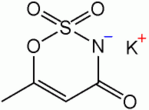Acesulfame
Acesulfame potassium is a calorie-free artificial sweetener, also known as Acesulfame K or Ace K, and marketed under the trade names Sunett and Sweet One. In the European Union it is also known under the E number (additive code) E950. It was discovered accidentally in 1967 at Hoechst AG. more...
Chemically, acesulfame potassium is the potassium salt of 6-methyl-1,2,3- oxathiazine-4(3H)-one 2,2-dioxide. It is white crystalline powder with molecular formula of C4H4NO4KS and molecular weight of 201.24.
Acesulfame K is 100-200 times sweeter than sucrose (table sugar), or about half as sweet as aspartame or saccharin. Like saccharin, it has a slightly bitter aftertaste, especially at high concentrations. Kraft Foods has patented the use of sodium ferulate to mask acesulfame's aftertaste. Alternatively, acesulfame K is often blended with aspartame or other sweeteners. These blends are reputed to give a more sugar-like taste where each sweetener masks the other's aftertaste, and to exhibit a synergistic effect wherein the blend is sweeter than its components.
Unlike aspartame, it is stable under heat, even under moderately acidic or basic conditions, allowing it to be used in baking, or in products that require a long shelf life.
Acesulfame K has been approved for use in foods in Europe since 1983, in the United States since 1988, and in Canada since 1994. In 1985, the European Union's Scientific Committee for Food published a comprehensive assessment of sweetening agents. This committee of toxicological experts from the EU member countries accepted Acesulfame K for use in foods and beverages. Safety of usage of Acesulfame K has also examined by JECFA, with the conclusion that Acesulfame K is safe to use, at least at levels less than the acceptable daily intake of 15 mg/kg of body weight.
However, the studies that purport to show safety have been challenged by a number of individuals and organizations, most notably the Center for Science in the Public Interest in the USA. They claim that the existing studies are inadequate (despite being peer-reviewed), that there are flaws in the research protocols, dosing, and time length of the studies, and that as a result the carcinogenicity of acesulfame K may not be properly understood. In particular they note that there have not been long-term human studies, so they doubt the studies which show that acesulfame is rapidly absorbed and then excreted unchanged (i.e. not metabolized by the human body) are representative of the long-term. But the scientific consensus is still that acesulfame K is completely safe, which is the view put forth on the sweetener industry's public relations website, IFIC.
Popular products containing acesulfame K include Diet Rite Cola, Pepsi One/Pepsi Max, Coca-Cola Zero, Diet Coke with Splenda, Trident gum, and sugarfree Jell-O. In diet sodas it is almost always used in conjunction with another sweetener, such as aspartame or sucralose.
Read more at Wikipedia.org



